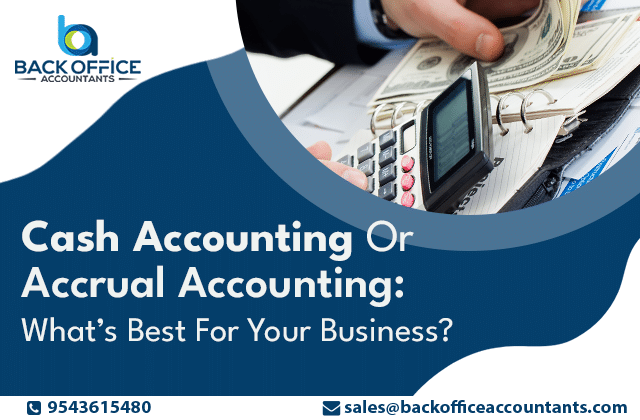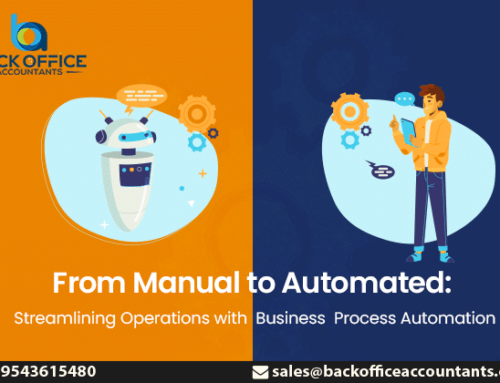Accounting plays a crucial role in businesses by maintaining records of financial transactions. Two accounting methods are commonly used by businesses, namely cash accounting and accrual accounting. The choice of accounting method can have several impacts on the business, such as how expenses and revenue are recorded.
Benefits of Cash Accounting:
Cash accounting is an uncomplicated method of bookkeeping that records financial transactions as and when money exchanges hands. The following are some of the benefits of employing cash accounting:
1. Simplicity:
Cash accounting is a straightforward and easy-to-grasp technique, making it a preferred option for small enterprises. It necessitates less paperwork than accrual accounting, which implies that you may devote less time to accounting duties.
2. Cash Flow Management:
Cash accounting enables you to monitor your cash flow in real-time, giving you the ability to make well-informed financial decisions for your business. It provides you with a clear understanding of your current cash balance, allowing you to make better financial decisions.
3. Tax Benefits:
Small businesses can benefit from using cash accounting, as it provides them with tax benefits. This is because they can delay the payment of taxes on income until they receive payment from their customers. Cash accounting can be especially useful for businesses that have fluctuating cash flows or long payment terms.
4. Reduced Complexity:
Using cash accounting requires less complex accounting software compared to accrual accounting. This is a significant advantage for small businesses that do not have dedicated accounting personnel or enough budget to hire outside accounting help.
Benefits of Accrual Accounting:
Accrual accounting is a popular accounting method among large businesses and high-revenue generating organizations. By adopting this method, businesses can benefit in numerous ways.
1. Accuracy:
One major benefit of accrual accounting is the accuracy it provides. It gives a more precise understanding of the company’s financial condition by recording revenue and expenses when they occur, rather than when payment is received or made. This helps in obtaining a clear view of the company’s financial position.
2. Better Financial Planning:
Accrual accounting can also aid in financial planning. It provides an accurate picture of the company’s revenue and expenses, helping to anticipate future costs and revenue. This is particularly helpful when dealing with long-term projects or contracts.
3. Compliance:
According to the Generally Accepted Accounting Principles (GAAP), businesses are required to use the accrual accounting method. This means that using accrual accounting can help them comply with accounting standards, which is important for businesses that intend to go public or seek financing.
4. More Detail:
Using accrual accounting can provide more detailed financial information on the company’s financial statements than cash accounting. This can be beneficial for businesses that want to provide investors or lenders with detailed financial information.
Which One Fits Your Business?
To determine the most appropriate accounting method for your business, you must consider your specific needs and circumstances. Outsourcing accounts receivable services and accounts payable services to a professional firm can improve financial management. Cash accounting and accrual accounting are two options to choose from, and various factors influence the selection.
1. Business Size:
When deciding between cash accounting and accrual accounting, the size of your business is a crucial factor to consider. Small businesses typically use cash accounting, while larger businesses prefer accrual accounting. This is because accrual accounting involves more record-keeping and is more complex than cash accounting.
2. Business Type:
Your business type is another important factor to consider when selecting an accounting method. If your business involves long-term projects or contracts, accrual accounting might be the best option as it provides a more accurate picture of your revenue and expenses.
3. Revenue:
The amount of revenue generated by your business can impact your accounting method selection. If your business generates low revenue and involves simple transactions, cash accounting might be more appropriate. However, if your business generates higher revenue and involves complex transactions, accrual accounting might be a better choice.
4. Tax Implications:
When choosing an accounting method, it is essential to consider the tax implications. Small businesses can benefit from cash accounting, while accrual accounting may be necessary to comply with accounting regulations.
5. Business Goals:
Your business goals may influence your accounting method choice. For instance, if you plan to seek financing or go public, you may need to use accrual accounting to comply with accounting standards.
Having a dependable and experienced accountant in bookkeeping and accounting services is crucial, regardless of the accounting method you choose. This is where Back Office Accountants can assist you. They specialize in bookkeeping, accounting, and tax preparation, and can provide cash accounting tips to your business in maintaining accurate financial records, minimizing tax liabilities, and making informed decisions that promote growth and profitability.







